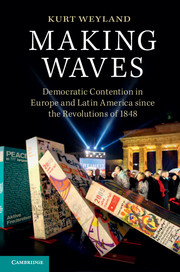Book contents
- Frontmatter
- Contents
- Acknowledgments
- 1 Introduction: Puzzling Trends in Waves of Contention
- 2 A New Theory of Political Diffusion: Cognitive Heuristics and Organizational Development
- 3 Organizational Development and Changing Modes of Democratic Contention
- 4 The Tsunami of 1848: Precipitous Diffusion in Inchoate Societies
- 5 The Delayed Wave of 1917–1919: Organizational Leaders as Guides of Targeted Contention
- 6 The Slow but Potent “Third Wave” in South America: The Prevalence of Negotiated Transitions
- 7 Crosscurrents of the Third Wave: Interorganizational Competition and Negotiation in Chile
- 8 Theoretical Conclusions and Comparative Perspectives
- Bibliography
- Name Index
- Subject Index
6 - The Slow but Potent “Third Wave” in South America: The Prevalence of Negotiated Transitions
Published online by Cambridge University Press: 05 June 2014
- Frontmatter
- Contents
- Acknowledgments
- 1 Introduction: Puzzling Trends in Waves of Contention
- 2 A New Theory of Political Diffusion: Cognitive Heuristics and Organizational Development
- 3 Organizational Development and Changing Modes of Democratic Contention
- 4 The Tsunami of 1848: Precipitous Diffusion in Inchoate Societies
- 5 The Delayed Wave of 1917–1919: Organizational Leaders as Guides of Targeted Contention
- 6 The Slow but Potent “Third Wave” in South America: The Prevalence of Negotiated Transitions
- 7 Crosscurrents of the Third Wave: Interorganizational Competition and Negotiation in Chile
- 8 Theoretical Conclusions and Comparative Perspectives
- Bibliography
- Name Index
- Subject Index
Summary
The preceding chapter explained why the wave of regime contention unleashed in part by the Russian revolutions unfolded less precipitously but with greater success than the tsunami of 1848. My analysis demonstrated the importance of organizational development for the domestic processing of external triggers. In 1917–19, representative leaders, especially Social Democrat Party politicians and unionists, responded to the foreign precedent of a dramatic revolution with much greater deliberation and prudence than unorganized, leaderless crowds had during the mid-nineteenth century. Rather than rushing into challenges to autocratic governments, they waited for a promising opportunity, which the end of World War I provided. This crucial change at the reception side slowed down diffusion, but led to greater progress toward democracy.
The third wave of democratization spread through Latin America at even lower speeds yet with particularly high success; emulative contention ushered in regime transitions in country after country, sooner or later. This diffusion process gathered momentum in Portugal, Greece, and Spain in 1974–75, but then took a few years to cross the Atlantic Ocean. In South America, regime contention erupted in Bolivia and Peru in 1977, Ecuador in 1978, Argentina in 1982, Brazil, Chile, and Uruguay in 1983, and Paraguay in 1987. Democracy was instituted in Ecuador in 1979, Peru 1980, Bolivia 1982, Argentina 1983, Uruguay 1984, Brazil 1985, Paraguay 1989, and Chile 1990. While the demise of authoritarian regimes among next-door neighbors, from Ecuador to Paraguay, suggests direct contagion effects, the dominoes fell much less quickly than in 1848. But only two contentious efforts failed, in Bolivia 1978–80 (Whitehead 1986a) and Chile 1983–84 (see Chapter 7), and both countries managed to democratize soon thereafter. Compared to 1848, the third wave thus occupies the opposite pole in the negative correlation between diffusion’s speed and success; its scores on these two dimensions differ significantly from the revolutions of 1917–19 as well.
- Type
- Chapter
- Information
- Making WavesDemocratic Contention in Europe and Latin America since the Revolutions of 1848, pp. 156 - 191Publisher: Cambridge University PressPrint publication year: 2014



